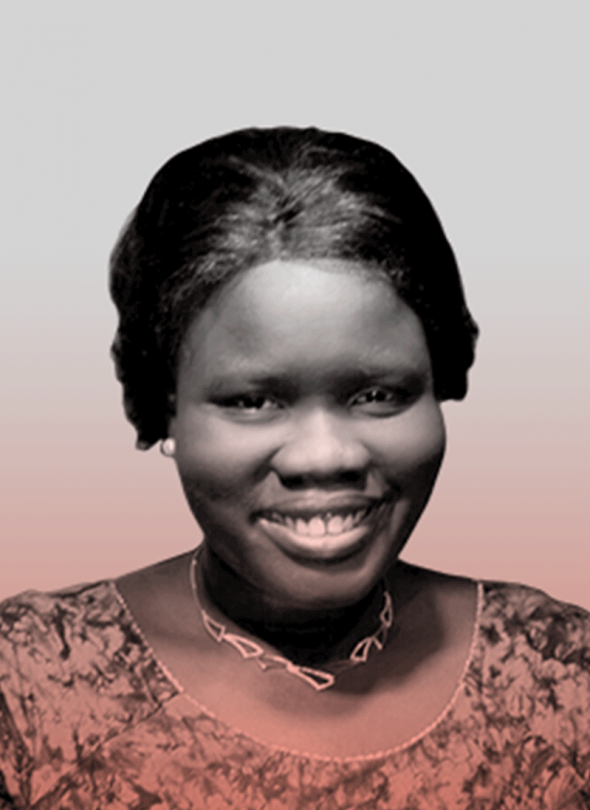{UAH} Elizabeth Nyeko, 34 - MIT
Elizabeth Nyeko thinks she's found a solution to one of rural Africa's key development challenges: how to electrify communities in a way that's affordable—and efficient.
As CEO of Modularity Grid, a London-based startup, Nyeko builds technologies that improve the performance of mini-grids, small-scale electricity generation and distribution systems that power homes and businesses in areas where extending national grids is too expensive. Yet mini-grids also have limitations. As Nyeko learned at Mandulis Energy, a company she cofounded that built a biomass-fired mini-grid in northern Uganda, the electricity demand of individual customers is very hard to track, which typically leads to overproduction of power, inefficient use of fuels, and inflated electricity prices.
At Modularity Grid, Nyeko designed an intelligent cloud-based platform that enables mini-grid operators to better track and predict individual consumption; it then redirects excess electricity to specific users in need of constant power, called "anchor loads." At the Mandulis site in Uganda, where Nyeko is piloting her Modularity Grid solution, the anchor loads include the village rice mill—which also provides the rice husks used to fuel the mini-grid itself. "If we can deliver just the amount of electricity to people that they need, and redirect the rest to something that creates value for a rural community, we can make mini-grids viable in a low-income setting," Nyeko says.
Nyeko, who was born in northern Uganda but fled from civil war there as a child, is now marketing her solution to other mini-grid providers and is set to begin work with Total and Vinci Energies on further power projects across Africa. Eventually, she believes, her solution can also help make national grids more efficient—in Africa and beyond.
—Jonathan W. Rosen
The gatekeepers to innovation may question whether someone named Jennifer or Patricia can be inventors--a study out of the Yale School of Management found that men were more likely to see their patent applications approved than women, but that this disparity decreased for women with less traditionally female names. Those at the U.S. Patent Office may reconsider their assumptions after checking out the 2018 MIT Technology Review's 35 Innovators under 35. For the first time in the list's nearly 20-year history, the majority of young innovators are women.
From working to make electricity more accessible to building smarter robots, the 18 women on this list are proving that creativity is not gender-based, at a time when still nearly 80 percent of patents are given to men. Meet five visionary women with some of the most groundbreaking ideas for reshaping our world.
1. Elizabeth Nyeko, Modularity Grid, 34
Nyeko is working to make sure rural communities in Africa have electricity -- sustainably. She has developed a mini-grid to serve the areas that are too expensive for national grids to cover. But unlike others available, which can overproduce electricity, Nyeko's Modularity Grid is a cloud-based platform that can predict consumption and redirect excess to where it is needed.
2. Shehar Bano, Tackling State Censorship, 31
Bano was frustrated with the state-censorship in her native Pakistan that prevented access to websites like YouTube. So as a computer science postdoctoral researcher at University College London, she conducted the first systematic study of state censorship on the internet. Her research has led to not only a better understanding of how such systems work but several workarounds for people in need of unfettered access to the web.
3. Hera Hussain, Chayn, 28
Hussain is the founder of Chayn, an online platform for women seeking resources for how to handle domestic violence--including how to build a case without a lawyer. Chayn is an open-source medium for survivors and experts to share their knowledge, which she found is often either entirely missing or incredibly biased.
4. Joy Buolamwini, Algorithmic Justice League, 28
Buolamwini founded the Algorithmic Justice League, which aims to take down bias in machine learning. As a researcher at the MIT Media Lab, Buolamwini has found that AI is significantly better at recognizing the faces of lighter skin males than darker-skinned females (compare error rates of 1 percent and 35 percent, respectively). Already a Rhodes Scholar and Fulbright Fellow, Boulamwini isn't stopping until the technology becoming increasingly part of societal institutions is representative of all people.
5. Chelsea Finn, Berkeley Artificial Intelligence Lab, 25
A challenge of many robots on the market is their limited skill sets: they can only do tasks they have been programed to do. But Finn's robots are changing this. They learn how by watching and repeating, just as toddlers copy adults. If Finn, a PhD student at UC Berkeley, is successful, we will have a generation of robots that require less programming and have broader skill sets.

Disclaimer:Everyone posting to this Forum bears the sole responsibility for any legal consequences of his or her postings, and hence statements and facts must be presented responsibly. Your continued membership signifies that you agree to this disclaimer and pledge to abide by our Rules and Guidelines.To unsubscribe from this group, send email to: ugandans-at-heart+unsubscribe@googlegroups.com









0 comments:
Post a Comment